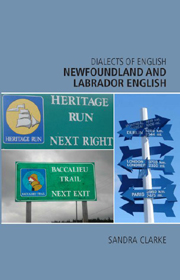3 - Morphosyntax
Published online by Cambridge University Press: 12 September 2012
Summary
Introduction
Contemporary varieties of standard English differ to a much greater degree in terms of accent and sound system than they do with respect to their grammatical patterns. Though certain differences relating to word structure (morphology) and sentence structure (syntax) are evident if, say, standard Newfoundland or Canadian English is compared to standard British English, on the whole, standard varieties of English throughout the world display shared grammatical features. Likewise, English varieties spoken by those towards the lower end of the socioeconomic spectrum share a number of grammatical features which are judged non-standard, no matter where in the English-speaking world they are found. These include forms such as she don't go there (rather than she doesn't go there), they seen it (rather than they saw it) and we don't want no favours (instead of … any favours).
What is unusual about the English of present-day NL (Newfoundland and Labrador), however, is the rich array of non-standard morphosyntactic patterns that it displays. These extend well beyond the type of features just cited, labelled ‘mainstream non-standard’ by Hay et al. (2008). They include many grammatical patterns inherited from source areas in the British Isles and Ireland. A small number of these – including the Irish after-perfect form, as in I'm just after doing it, meaning ‘I've just done it’ – also occur in contemporary Standard Newfoundland and Labrador English (SNLE).
- Type
- Chapter
- Information
- Newfoundland and Labrador English , pp. 67 - 101Publisher: Edinburgh University PressPrint publication year: 2010



